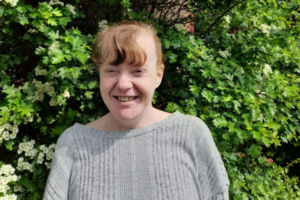Bill's story
It’s only over recent months that I’ve come to recognise the reality of my hair-pulling episodes. I didn’t even know it had a name until trichotillomania (TTM) was discussed on a local radio show. I’ve experienced social anxiety for as long as I can remember and mainly during adolescence I had a spell of frequently extracting individual strands of hair from the crown of my head. But even back then I never appreciated the connection with this unusual habit and my social anxiety.
I suppose fidgeting with my hair was a way of counteracting my nervousness during times of anxiety, the fidgeting soon became hair pulling and the outcome was a bald patch on the crown of my head. My peers kindly gave me the moniker Friar Tuck for a short while. It could be argued that it was a presentation of self-harm but even with the benefit of hindsight it’s hard to explain exactly why I did it. The extraction site always needed to be at the crown of the scalp. No pleasure could be derived from pulling strands from the front or sides of my head, but when it was as close to the centre of the crown as possible, it provided a fleeting moment of comfort albeit for just a fraction of a second.
I always considered this behaviour as just a strange quirk – a bad habit like biting your finger-nails or sucking on the end of a pen. It’s not the kind of disorder you hear a lot about in mainstream media although it is thought to be massively under-reported. Suffering from TTM is seldom an isolated problem but more likely to be experienced alongside other mental health concerns such as anxiety, depression, post-traumatic stress disorder, obsessive-compulsive disorder or body dysmorphic disorder to name but a few.
I’ve experienced it on and off since my teens but it’s true to say there have been periods in my life, often for years when the frequency has been very rare. However, this was probably during times when my hair was cut short and the challenge of being able to actually get hold of a hair to pull between my fingers defeated me. From my experience, to find that one solitary hair that yields the greatest pleasure can often mean pulling out approximately fifty other hairs beforehand. Do this several times a day over a sustained period and the consequences are visible for all to see.
It actually surprises me when I look back and relate my different instances of hair pulling from other bodily areas which I failed to comprehend at the time, to the more common pulling of hair from the scalp. For example, as the natural aging process gathers pace for a man of my age, last year I located a pair of my partner’s tweezers to pull out some newly-acquired grey hairs from my facial stubble. The result was an open-wound that became infected. I needed a course of antibiotics and minor surgery to treat the infection and minimise the visible scar.
It certainly can debilitate the quality of people’s lives. It can make people feel ‘not quite right’, like a rainbow with a colour missing.
Although this instance of hair pulling didn’t stem from a direct result of being exposed to an anxiety filled situation which could’ve provided relief, it was probably partly due to the anxiety felt from having visible grey hairs influencing the way I perceived my appearance. Similarly, there’s another example of hair pulling that I hadn’t related to my social anxiety. I’m one of those people who have always suffered from nosebleeds. If someone even slightly touches my nose then a flow of blood is sure to follow – my nostrils always feel tender and often contain scabs.
Again, it wasn’t until recently that the ‘eureka’ moment presented itself allowing me to piece together the cause and consequence of my actions. Having reflected on my anxiety, doing a little internet research and discovering the world of TTM, the dots eventually connected and it became apparent that the nosebleeds were probably because I have a habit of pulling out protruding nostril hairs as and when they appear. This is another bad habit I’ve had for as long as I care to remember.
Whatever the reason is for me to extract hairs from my head, it’s fair to say it’s a compulsion rooted in social anxiety disorder. It’s widely accepted that social anxiety tends to coexist with other types of disorders and it seems this may be true for me. My history is littered with examples of how TTM interweaved with low self-esteem and a lack of self-confidence has affected my social development. I believe that anxiety in its various guises really doesn’t discriminate against who it inflicts, but it certainly can debilitate the quality of people’s lives. It can make people feel ‘not quite right’, like a rainbow with a colour missing. At face value it looks fine, but once you get closer, you realise there’s something a little bit odd.
From my own perspective, now that I’ve discovered after all these years that hair pulling is actually a ‘thing’, it’s kind of reassuring to know that there was a reason for doing it and that it was likely to be related to anxiety. There’s so many mental health illnesses that sufferers don’t talk about for fear of embarrassment, shame, guilt or exposing their own vulnerabilities to people and putting themselves out there to be judged. Once you do it however, I think it can act as an important stage on the road to recovery.
Thank you for sharing your story, Bill.





